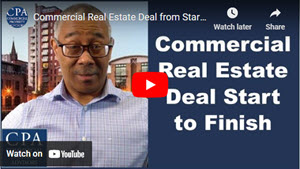
Is it smart to purchase multi-family apartments in the heart of farmland? Can you even make money investing in rural communities? Well, the answer is yes! Armed with the right information you can wisely invest in rural commercial property with tremendous success. In this post, you’ll learn how to navigate around the land mines and buy rural commercial property wisely.
Why Invest in Rural Commercial Real Estate?
The main reason rural commercial real estate investing is so attractive is that it is an untapped market with little competition. There are plenty of opportunities for commercial investors in rural areas to invest in storage units, apartment buildings, or mobile home parks. Sellers aren’t getting flooded with offers from investors to buy their property, which enables you to easily create solid relationships.
Since commercial real estate is a relationship-based business, this makes it a tremendous opportunity and enables you to create a better deal because the seller is more open to creative financing. Nearly all our deals in rural communities have some component of creative financing which gives us a greater return, higher cash on cash and more cashflow.
Commercial Real Estate is a Relationship Business
One of the things that is a positive as an investor in rural areas is that building relationships is easy. People are more open, personable, and easy to relate to. You can meet over coffee and begin to build a relationship with the seller, finding out their motivations and what they want to get out of the deal.
4 Components of a Good Rural Commercial Deal
Strong Radial Population: A small town supported by bigger cities is perfect for rural investing.
Stable Job Growth: Choose areas were there are new employers moving into town and the employment stats in the area are positive.
Understand the Demographics: Know who the potential renters are and where they work. Some renters will be commuting to the larger centers, while others will be employed on farms or run small businesses in town.
Solid Property Management: Finding a property manager in a small town can be a challenge. Look for one who has a wealth of market knowledge since you may have trouble accessing that on your own.
Understanding Your Submarket
Rural property is a submarket, like downtown or the suburbs. Often in rural areas it’s a farming community. To be successful you must understand your submarket and know the demographics of your submarket. Here are the key 3 key things you must know:
Submarket Cap Rate: Understanding the submarket cap rate enables you to place a proper value on the property and know if you’re overpaying or if you’re getting a good deal.
Comparable Sales: You need to know what things are selling for in and around the area. In some cases, you may not be able to find immediate comparable sales for the area. This means you will need to go a little further outside the area to get sales data to make sure you are buying at the right level.
Comparable Rents: You need to know what apartment units are renting for, so you know where you stand in the marketplace. This also helps guide how extensively you renovate because you know how high you can raise the rents in the current market.
The #1 Pitfall of Rural Commercial Real Estate Investing
The number one pitfall is the lack of data available in rural areas. This is because a lot of the data miners haven’t gathered extensive information on rural communities. Another important factor is that there are a lot of closed transactions. To make a wise and informed decision on which rural property to buy you need to know the jobs data, population trends and infrastructure. I use the following websites as tools when determining what areas to invest in:
Example Rural Commercial Deal:
Property: 12-unit multi-family apartment complex, situated in a town of twenty-five thousand. It’s a little property tucked away in a nice established residential area; a little bit secluded but still close to everything.
Asking Price: $600,000. After looking at the numbers, an offer was made for $500,000 which the seller accepted.
Finding Creative Solutions:
Upon looking at the property closer, it was discovered that four upper level balconies needed replacing and the roof needed some work. The seller wasn’t willing to reduce the price further, so the investor was forced to come up with a creative solution to make the deal work.
Because a relationship had been established with the seller, the investor knew that the owner was a contractor and had built the properties. So, he asked him if he would be willing to be the contractor after they closed the deal. The seller agreed and was able to give discounted rates on materials and provide his labor and his crew at a reduced price. Moving forward, it continues to be a good relationship that can be beneficial for them both.
Creative Financing:
This investor already had several residential investment properties but didn’t have a lot of money for the down payment. For financing they approached their local lender who had financed their residential properties. The lender was willing to work with them, and after negotiations, the lender agreed to credit the equity in the residential properties. The commercial investor put down a small percentage of cash, and the remainder was secured as collateral by his property. Still, they needed to come up with more money, so they approached the seller and asked if he would be willing to carry a second mortgage for a time. The seller agreed.
For creative financing like this, you need commercial deals that have a great story. Lenders love great stories, and it’s easier to develop great stories when you have a lack of competition and a great relationship with the seller.
5 Keys to Success for Beginner Commercial Investors
1. Get a Mentor:
Having access to a good mentor, leaning on their knowledge and experience to guide you makes ensures avoid making mistakes, wasting valuable time and resources.
2. Be Flexible:
You need to be flexible as the deal grows because it’s doesn’t always turn out how you anticipate. As in my example deal, you need to find creative solutions to problems that arise. Never give up. There’s always a way to make it work.
3. Build Relationships:
One of my favorite sayings is this business is, “It’s all about relationships”. Commercial real estate is a people business, and this is particularly true in rural communities. In my example, that relationship and understanding the seller motivations ultimately lead to a successful deal.
4. Follow Through:
There will be times of discouragement, when you’re so close and the deal looks like it might just blow up. You need to keep going, adjusting and follow through.
5. Build a Team:
To be successful you need to build a team. This can include a coach or mentor, a property management company, and a maintenance team.



